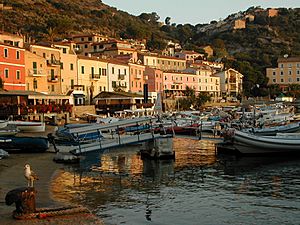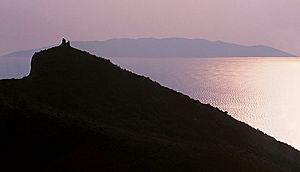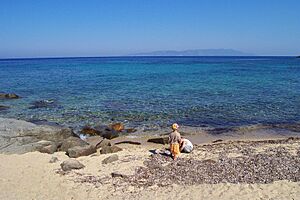Giglio facts for kids
Quick facts for kids
Isola del Giglio
|
|
|---|---|
| Comune di Isola del Giglio | |

Giglio Harbour
|
|
| Country | Italy |
| Region | Tuscany |
| Province | Grosseto (GR) |
| Frazioni | Isola di Giannutri, Giglio Castello, Giglio Porto, Giglio Campese |
| Area | |
| • Total | 23.80 km2 (9.19 sq mi) |
| Elevation | 405 m (1,329 ft) |
| Population | |
| • Total | 1,458 |
| • Density | 61.26/km2 (158.66/sq mi) |
| Demonym(s) | Gigliesi |
| Time zone | UTC+1 (CET) |
| • Summer (DST) | UTC+2 (CEST) |
| Postal code |
58010, 58012, 58013
|
| Dialing code | 0564 |
| Patron saint | San Mamiliano |
| Saint day | September 15 |
Giglio Island (which means Isola del Giglio in Italian) is a lovely island in Italy. You can find it in the Tyrrhenian Sea, just off the coast of Tuscany. It's part of the Province of Grosseto and also part of the Tuscan Archipelago, a group of islands.
Contents
Exploring Giglio Island's Geography
Giglio Island is about 16 kilometers (10 miles) from the Argentario coast. It is mostly a mountainous island. The land is almost entirely made of granite.
Highest Point and Plant Life
The highest point on the island is called Poggio della Pagana, which is 496 meters (1,627 feet) high. Most of the island, about 90%, is covered in Mediterranean plants. You'll also find large pine forests and many vineyards here. These vineyards help make a special local wine called "Ansonaco."
Giglio's Coastline and Beaches
The coastline of Giglio Island is 27 kilometers (17 miles) long. It has rocky areas and smooth cliffs. There are also several beautiful bays. Some of the popular bays include Arenella, Cannelle, Caldane, and Campese. Campese is the biggest bay and has a small village with the same name.
A Look at Giglio Island's History
Giglio Island was probably formed about 4.5 to 5 million years ago. People have lived on the island since the Iron Age. It might have been an important military base for the Etruscans.
Giglio in Ancient Times
During the time of the Romans, Giglio was a key base in the Tyrrhenian Sea. Famous writers like Julius Caesar mentioned it in his book De Bello Gallico. The poet Rutilius Claudius Namatianus also wrote about the island.
Medieval History and Attacks
In the year 805, Charlemagne gave the island to an abbey in Rome. Over time, different powerful families owned Giglio. These included the Aldobrandeschi, Pannocchieschi, Caetani, and Orsini families. The town of Perugia also owned it for a while.
In 1241, a big sea battle happened near Giglio. The fleet of Emperor Frederick II from Sicily defeated a fleet from Genoa. From 1264, Giglio was controlled by Pisa, and later by the Medici family. The island faced many attacks from Saracen pirates. These attacks finally stopped in 1799.
Island's Mineral Riches
Throughout its history, Giglio Island was known for its valuable minerals. Many columns and buildings in Rome were built using granite from Giglio.
Ancient Discoveries on Giglio Island
Giglio Island holds remains from its long history. You can find the ruins of a Roman villa in the Giglio Porto area. This villa belonged to Domitius Ahenobarbus and dates back to the 1st or 2nd century AD.
Religious Art and Shipwrecks
The church of San Pietro Apostolo in Giglio Castello has a special ivory crucifix. Many people believe this crucifix was made by the famous artist Giambologna.
The island is also where an Etruscan shipwreck was found. This ship sank around 600 BC, during the early Iron Age. The ship's cargo included copper and lead blocks, iron tools, amphorae (jars), and a helmet from Corinth. Even a wooden writing tablet with a stylus was found! Sadly, most of these amazing finds are now lost.
Getting to Giglio Island
You can travel to Isola del Giglio by taking a ferry. These ferries leave from Porto Santo Stefano and Orbetello Scalo on the Tuscan coast.



